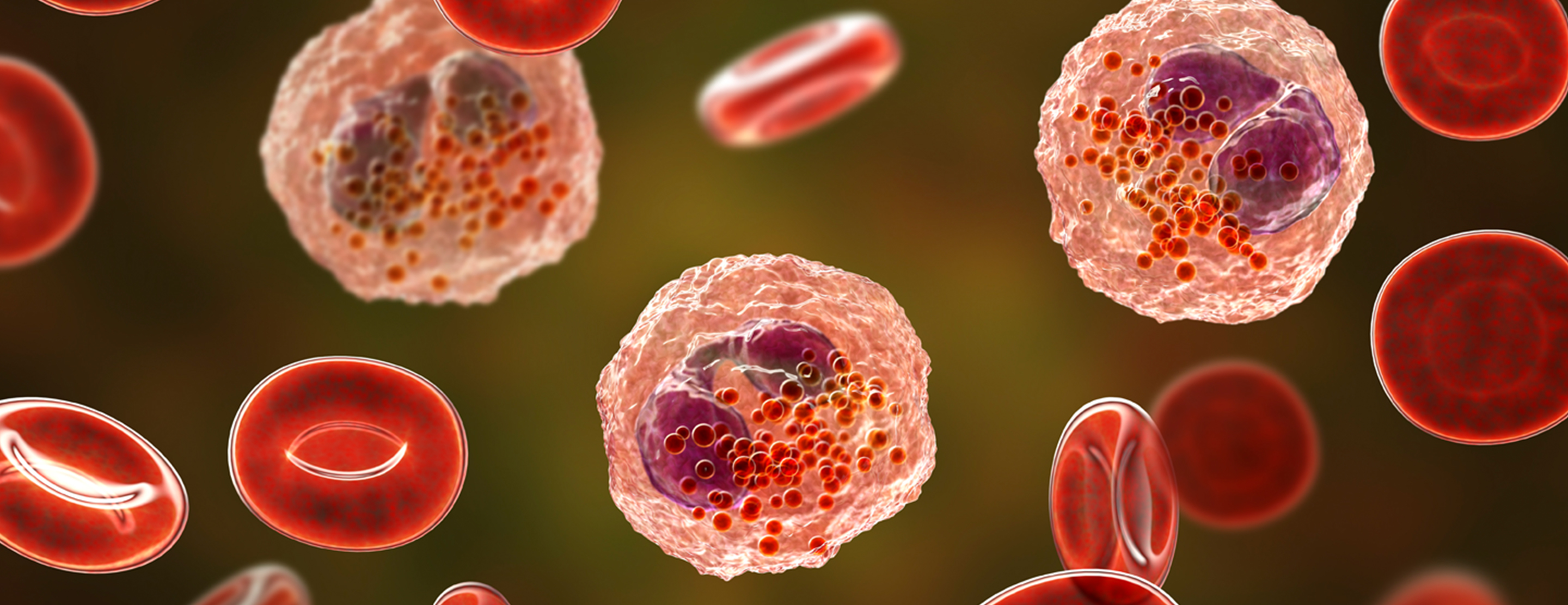Eosinophilia
Overview | Possible Causes | Care and Treatment | HOME REMEDies | When to Call the Doctor | References

Overview
Eosinophilia refers to a condition of having an increased number of eosinophils in the peripheral blood. White blood cells are an essential component of the cellular immune system. Eosinophils are specific white blood cells that are a normal part of the cellular immune system. They play a role in normal physiologic processes and host defence, and participate in allergic reactions and the defence against parasitic infections.
Eosinophilia is said to occur when there are greater than 500 eosinophils per microliter, though the exact cutoff varies by laboratory. Eosinophilia can be considered mild, moderate or severe. Usually, less than 5% of the circulating white blood cells in a person are eosinophils.
Possible Causes
Causes range from less serious but very common conditions such as nasal allergy and asthma to more serious hematologic conditions, including:
- Allergies and asthma
- Drug allergy
- Infections (mostly from parasites)
- Blood disorders and cancers
- Autoimmune disease
- Endocrine disorders
- Diseases involving organs and systems, including the:
- Skin
- Lungs
- Gastrointestinal system
- Neurological system
- Joints, muscles and connective tissue
- Heart
Eosinophilic disorders are often called by names that reflect where the problem is located. These include:
- Eosinophilic cystitis, a disorder of the bladder
- Eosinophilic fasciitis, a disorder of the fascia, or the connective tissue throughout the body
- Eosinophilic pneumonia, a disorder of the lungs
- Eosinophilic colitis, a disorder of the colon (large intestine)
- Eosinophilic esophagitis, a disorder of the esophagus
- Eosinophilic gastritis, a disorder of the stomach
- Eosinophilic gastroenteritis, a disorder of both the stomach and the small intestine
The last four types on the list are known as eosinophilic gastrointestinal disorders (EGIDs). This category of disease is increasing. Eosinophilic granulomatosis with polyangiitis involves the lungs, heart, sinuses, and other organs. It is also known as Churg-Strauss syndrome. Another condition is hypereosinophilic syndrome, which is a primary hematologic disorder involving the blood and other organs.
Care & Treatment
Diagnosis
Elevated peripheral blood eosinophils can be found during blood testing. Depending on what the cause could be, your doctor might order more tests. Other tests might include:
- Liver function tests
- Chest X-rays
- Urine tests
- Further blood tests
- Tissue and bone marrow biopsies
- Stool sample testing
Treatment
Similar to what diagnostic tests may be needed, treatment is determined by the cause of eosinophilia. Options include:
- Observation- If your eosinophilia is mild, observation with repeat labs may be recommended.
- If a medication is causing your elevated eosinophil count, it may be discontinued
- Maximizing therapy for asthma, eczema, and allergies
- Parasite infections are treated with anti-parasitic medications.
- Steroids such as prednisone may be used to treat hypereosinophilic syndromes
Home Remedies
Natural treatments may help control the symptoms, but they won’t cure eosinophilic esophagitis.
Some herbal remedies such as licorice and chamomile may help acid reflux symptoms. Acupuncture and relaxation techniques like meditation can also help prevent reflux.
Other strategies to try at home include raising the head of your bed to prevent reflux, maintaining a healthy weight, and avoiding foods that you know cause heartburn.
While these treatments don’t address the underlying cause of the eosinophil buildup, they could help keep you more comfortable.
Always talk with your doctor before starting any new treatment, especially any new herbal treatments.
When to Call the Doctor
Eosinophilia is usually found when your doctor has ordered blood tests to help diagnose a condition you're already experiencing. It's usually not an unexpected finding, but it's possible that it may be discovered simply by chance.
Talk to your doctor about what these results mean. Evidence of blood or tissue eosinophilia and results from other tests may indicate the cause of your illness. Your doctor may suggest other tests to check your condition.
It's important to determine what other conditions or disorders you may have. If you get an accurate diagnosis and can receive treatment for any relevant conditions or disorders, the eosinophilia will likely resolve.
If you have hypereosinophilic syndrome, your doctor may prescribe medications, such as corticosteroids. And he or she will want to monitor your health, as this condition may cause significant complications over time.
To book online consultation to meet our expert doctor click on the link below
Reference
- https://www.mayoclinic.org/symptoms/eosinophilia/
- https://my.clevelandclinic.org/health/diseases/17710-eosinophilia
- https://medlineplus.gov/eosinophilicdisorders.html






































































































